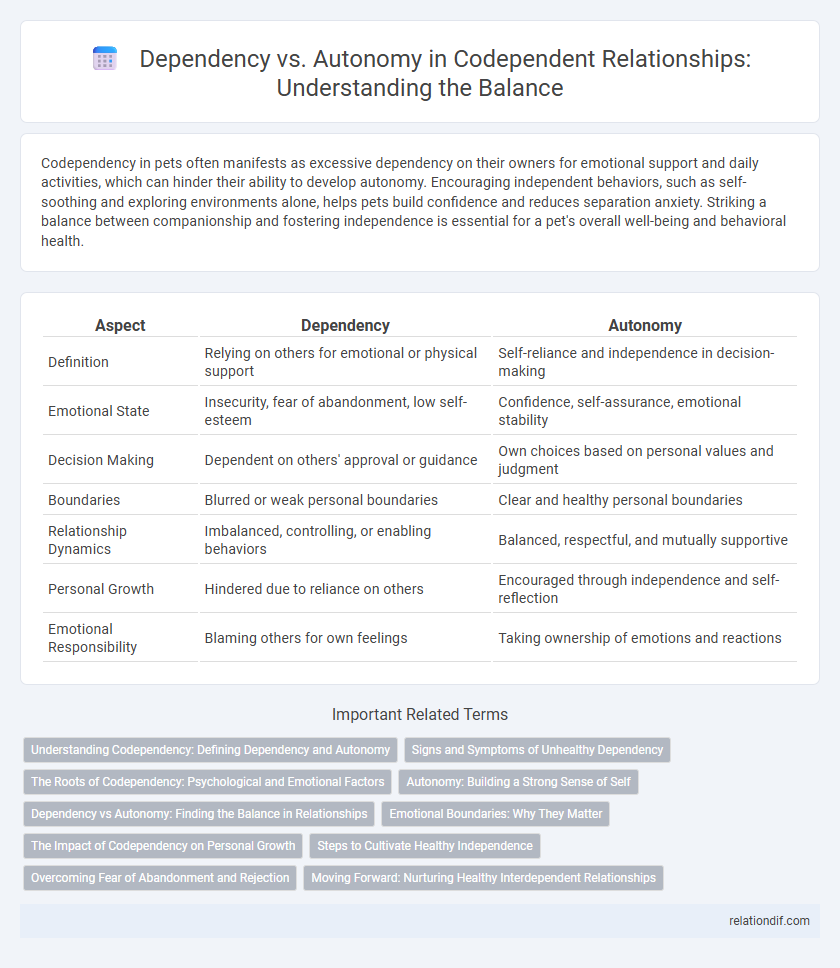Codependency in pets often manifests as excessive dependency on their owners for emotional support and daily activities, which can hinder their ability to develop autonomy. Encouraging independent behaviors, such as self-soothing and exploring environments alone, helps pets build confidence and reduces separation anxiety. Striking a balance between companionship and fostering independence is essential for a pet's overall well-being and behavioral health.
Table of Comparison
| Aspect | Dependency | Autonomy |
|---|---|---|
| Definition | Relying on others for emotional or physical support | Self-reliance and independence in decision-making |
| Emotional State | Insecurity, fear of abandonment, low self-esteem | Confidence, self-assurance, emotional stability |
| Decision Making | Dependent on others' approval or guidance | Own choices based on personal values and judgment |
| Boundaries | Blurred or weak personal boundaries | Clear and healthy personal boundaries |
| Relationship Dynamics | Imbalanced, controlling, or enabling behaviors | Balanced, respectful, and mutually supportive |
| Personal Growth | Hindered due to reliance on others | Encouraged through independence and self-reflection |
| Emotional Responsibility | Blaming others for own feelings | Taking ownership of emotions and reactions |
Understanding Codependency: Defining Dependency and Autonomy
Codependency is characterized by an excessive reliance on others for emotional support and validation, blurring the line between healthy dependency and unhealthy dependency. Autonomy involves maintaining a balanced sense of self, where emotional needs are met internally without sacrificing personal boundaries or self-identity. Understanding codependency requires recognizing the distinctions between interdependent relationships, where mutual support exists, and codependent dynamics, where one's identity and well-being are contingent on another's approval or control.
Signs and Symptoms of Unhealthy Dependency
Unhealthy dependency often manifests through excessive need for approval, fear of abandonment, and difficulty making decisions independently. Individuals may exhibit low self-esteem, rely heavily on others to regulate emotions, and experience anxiety when separated from significant relationships. These signs indicate impaired autonomy and an imbalanced reliance on external validation.
The Roots of Codependency: Psychological and Emotional Factors
Codependency often originates from unresolved psychological wounds and emotional neglect during early development, fostering unhealthy dependency patterns. Experiences such as childhood trauma, parental addiction, or inconsistent caregiving impair the ability to establish autonomous self-identity and set emotional boundaries. These factors lead to an excessive reliance on others for validation and self-worth, reinforcing the cycle of dependency over autonomy.
Autonomy: Building a Strong Sense of Self
Autonomy involves cultivating a strong sense of self by recognizing personal values, setting healthy boundaries, and making independent decisions without relying excessively on others for validation. Developing emotional self-regulation and self-awareness strengthens resilience and promotes psychological well-being. This process enhances the ability to maintain fulfilling relationships while preserving individuality and personal growth.
Dependency vs Autonomy: Finding the Balance in Relationships
Dependency in relationships involves relying heavily on others for emotional support and validation, often leading to a loss of personal autonomy. Autonomy promotes self-reliance and healthy boundaries, allowing individuals to maintain their identity while engaging in interdependent partnerships. Finding the balance between dependency and autonomy fosters mutual respect and emotional resilience, crucial for sustaining stable and fulfilling relationships.
Emotional Boundaries: Why They Matter
Emotional boundaries define where one person's feelings end and another's begin, establishing a crucial separation between dependency and autonomy. Maintaining clear emotional boundaries prevents enmeshment and promotes healthy interdependence in relationships. Strong emotional boundaries enable individuals to respect their own needs while acknowledging others, fostering personal growth and emotional resilience.
The Impact of Codependency on Personal Growth
Codependency often blurs the line between dependency and autonomy by fostering excessive emotional reliance on others, hindering personal growth. Individuals trapped in codependent relationships frequently sacrifice their own needs and desires, which stifles self-discovery and the development of independent decision-making skills. Overcoming codependency is crucial for reclaiming autonomy, enabling healthier boundaries and fostering authentic personal growth.
Steps to Cultivate Healthy Independence
Cultivating healthy independence involves establishing clear personal boundaries and developing strong self-awareness to distinguish between dependency and autonomy. Engaging in consistent self-reflection and practicing decision-making without external validation strengthens emotional resilience and fosters a sense of personal responsibility. Building supportive relationships that encourage individual growth further reinforces the balance between connection and independence in codependency recovery.
Overcoming Fear of Abandonment and Rejection
Overcoming fear of abandonment and rejection is crucial to shifting from dependency to autonomy in codependency recovery. Building healthy boundaries and fostering self-worth reduces reliance on others for validation, enabling emotional independence. Developing self-awareness and resilience empowers individuals to face relational insecurities without clinging to unhealthy attachments.
Moving Forward: Nurturing Healthy Interdependent Relationships
Moving forward in nurturing healthy interdependent relationships involves balancing dependency and autonomy by fostering mutual support while maintaining individual boundaries. Healthy interdependence encourages emotional connection without sacrificing personal growth or self-sufficiency. Establishing clear communication and respect for autonomy strengthens trust and promotes sustainable, supportive partnerships.
Dependency vs Autonomy Infographic

 relationdif.com
relationdif.com